Juan
How do you like your eggs? How do you want your next Don Giovanni adaptation? There's so many onstage versions – just do a youtube search! Would you like “Notte e giorno” in a Spanish environment, with Don Giovanni wearing a cloak, or should he be wearing only a Zorro-mask while wrestling with Anna, or perhaps even just holding up one hand to cover his face will do? Shall this take place in front of an office building, or in an industrial environment, in a forest or in New York City – you name it! It's like the Rubik's cube: everybody is twisting and turning it the way s/he thinks it'll work – to achieve the one and only result, that is allowing the audience to enjoy this beautiful piece at the greatest possible intensity.
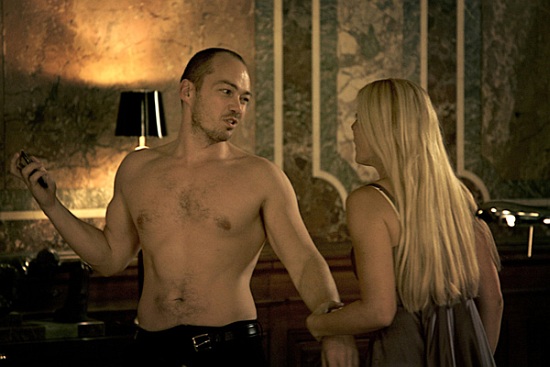
If you watch the trailer (and who would not do that?), you'll be inclined to think that Holten's adaptation is just an extreme modernist vision – with sex and guns and singer superstars in the shower – “on the basis of” the opera. To break thru this misleading image (and finally get to this outstanding movie adaptation) you only have to ask one question from someone who has already seen it: “how does it start?” – meaning what do you see during the overture? Then you'll be told, perhaps in a form of a quick recitative, still under the influence of the movie, that (after some flashes from a car chase) he is in the opera, in the opera house, watching the Don Giovanni, and in the break after ACT 1. he'll be introduced to a beautiful blonde woman, who after the show will choose to walk home alone (instead of taking a cab with her fiance) and so “accidentally” she'll catch sight of him in a café, and join him, and very shortly they'll be heading to her apartment, and her name is Anna, of course, and her father lives next door to her … By the time you're told all this, either you'll be amazed how virtuously thought up and brilliant adaptation this must be, or you're just not acquainted to this wonderful piece – yet :)
the challenge of visualization
Everybody wants the same from this opera. We want to see it happen live, want to see it work, want to enjoy it – in real time, in its fullness, with all the dramatic happenings included. Not only us, even the artists want that, they can't perform these arias without getting into acting somehow :)) We all want the same, a great performance. We have the sheet music, lots of documentations and many great recordings from the past 80-100 years – mostly audio. Practically, we have the “soundtrack” without the “visual track”, and we have no clear idea how to make one, how to make the dramatic onstage/onscreen happening work.
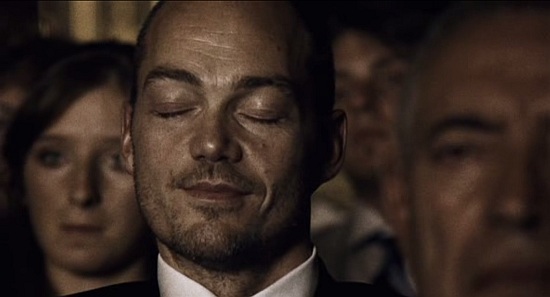
When you listen to it with eyes closed, it's the easiest – you'll be free to imagine it, but not forced, so visualization will surely not disturb you in enjoying. As for a semi-scenic performance, it's already too much of the artists on the stage without an “action” which would involve them organically, so the magic is broken, you can enjoy only pieces of the whole. A scenic onstage performance can, however, relatively easily succeed since a live performance is always a great experience and your mind will be prompted anyway to use its “imaginary forces” like in Shakespeare's theater (see the Prologue of Henry V), so the situation of taking in will be well handled, whatever happens.
The real problem, of course, is adapting it for the screen. It seems merely impossible – it shouldn't but it does. Except for the one and only Lucey version all onscreen versions are actually stage versions filmed. There's so many of them, deploying anything to stimulate the audience and make it somewhat shocking, involving nudity and sex scenes, simplifying the story to that of a rapist who killed one of his victims' father with a “knife” and now he's on the loose :) Why do all these extravagant interpretations (respecting no borders) stick to the stage so respectfully – and despite living in age of costless HD video, go never beyond?
The famous Losey version is definitely one of the deterring elements. As a successful big-production, being totally traditional, faithful-to-the-letter, might discourage others to touch it. It stands there as a great milestone, or rather as a great marble statue demanding (commanding) respect for itself in the name of tradition and faithfulness. Quite a peculiar challenge regarding the nature of The Opera and the philosophical levels brought up by the beautiful Kierkegaard!
I mean isn't it as if “B” from the Either/Or had made a film of the Don Giovanni and all the fine people who laugh when “the rake” gets the retaliation at the end now would be respecting this great piece of movie? Officially everybody seems to like Losey's movie, even if it's very week at the concept, starting with the first 6 minutes being just an illustrated sequence putting us to wait for the movie to start, such strategic failure! Not to mention the traditional “wrestling” after “Notte et giorno” … which is just a symptom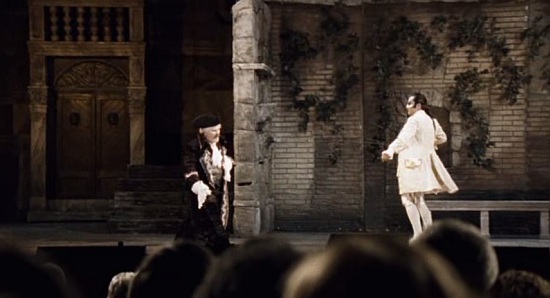
onstage performance in the film - Juan is watching this
We absolutely feel that a version by “A” should exist too – as a re-retaliation .) Speaking of which, it's heartwarming to see how our Juan in Holten's adaptation is chuckling at a traditional stage performance and calls it in the break time “boring”, cause whatever made him do that he, as the archetype of “A”, was doubtlessly looking down on that traditional performance from an “A”-ish point of view – which, if we like, could be taken as a statement from director Holten: challenge taken .))
Holten actually starts his version at full throttle, bold and daring, totally faithfully … – to the spirit of Don Giovanni, which Kierkegaard identified as the archetype of the character living in the esthetic “stadium”. According to this estheticness Holten shows nothing in his movie to cover the music track with images as if the opera was a music video. He will only show whatever … he likes :) Necessity doesn't exist! From the orchestra for example, during the overture, he'll only show a beautiful cellist woman who happens to be blond – sort of introducing the “idea” of a blond woman … which Anna will fulfill. This shot of the cellist girl makes it appear as if Juan was sucking her beautiful presence in while listening to the performance.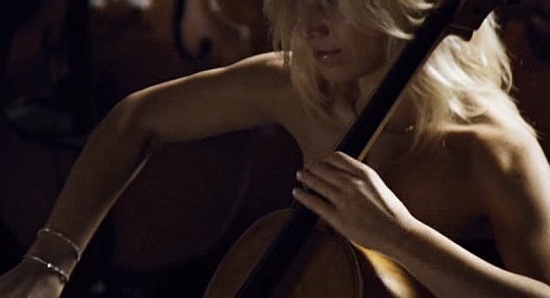
Bold and daring, totally reckless, Holten's movie adaptation of the opera is of utmost virtuosity, something never seen before. How could he do that? How could he make such a great breakthru which could only be compared to J.E. Gardiner's Messiah performance in the 80's which broke with all the meantime traditions in performance and reached back to Haendle's time to perform it the way it used to be, as it was meant to be performed originally … It worked like magic! So does Holten's adaptation now! How could he do that? And how come that others couldn't? (We know of a filmmaker even in Budapest who long wanted, for over ten years, to make a Don Giovanni movie but finally gave it up and adapted another opera in SAFE MODE, it was total boredom).
Where all the others (including who didn't actually try) would fail is narration. What makes a movie adaptation a delicate matter is that this opera is not a Beethoven's Pastoral that could be just illustrated, better or worse but never to fail. The Don Giovanni is not just music, it's Mozart's music of Da Ponte's “screen play”, and the two became one, the music incorporates all the dramatic composition. Arias, duettes, etc. are no decorative resting spots in the story, they make the body of the happening, that is the narration, the forward moving of the drama. What you see must be linked to this happening weaved into the music, and furthermore, it must serve as a 'basis'to what you end up hearing … this basis being the “ground floor” …
If you've ever been lucky to attend one of H.E. Weidinger's (founder of the Don Juan Archive in Vienna) unofficial early afternoon café lectures on the Don Giovanni, you'll know that there's a “ground floor” of narration (of what is happening) which once was common sense to the viewers. He would explain that this piece in its original cultural environment was a flesh and blood play for the stage, with all the details fully functional and making sense. Originally there's a strong and plain logic in the onstage actions and how they are linked to 'the music', but by course of time they've got alienated from the dimension of 'the music'(=Mozart's music of Da Ponte's screenplay), that's how Donna Anna will end up “wrestling” with Don Giovanni in a pointless situation, and that's how a stage performance can break down to singers singing in front of different backgrounds while imitating acting.
The “ground floor” is the drama, the dramatic happening, everything (the acting and the singing) is built upon that. According to H.E. Weidinger what we see must serve as this “ground floor” – instead of only covering the music with illustrative stage actions or, on screen, with images like a decorative music video. What we see must be linked to the happening which is weaved into the music, and must serve as a basis to that. For an abstact example, if we hear a train we should see a train which will give out that noise, or if we, say, hear a woman sing that she's happy to get married but a few minutes later she goes away privately with a rich guy to discuss something, we should see actions that will explain these moves that we hear sung.
Holten's concept
Holten's adaptation is really based on a great concept, realized at an amazing level of intensity, and while it's totally free and festive there's really a lot of thinking behind it. You really enjoy watching it, by which we mean actually watching it as a movie and not just sitting in front of a screen trying to enjoy the music. It is a beautiful piece itself, a hypnosis of the best kind from the opening scene till the credits start rolling – and even on … 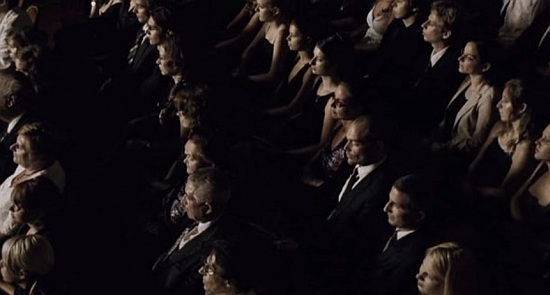
His concept is so direct and ingenious, one can't help wondering, what took us (7 billion people on Earth) so long!! What he did was that he took these brilliant artists to some spots of Budapest, which served as stage for them, and made them perform scenes of the opera – live, in front of a movie camera … – and a sound crew, yes, no lipsinging!!!! He made every scene actually happen in front of the camera instead of just mimicking it from this angle and that, and this made the whole thing so freshly live!
The other great element of his concept is rewriting. Performing it as live as never seen before could not have been enough in itself. Culture has changed since Mozart's time and today to the same thing we'll react differently than we would back then. Also, we are not so much into opera anymore, not to mention Italian, so even if it was the same performance as in 1787 the story and the context could become “sorta distant”, putting us “removed” (as Woody Alles calls this effect in Annie Hall :)). Here come Holten's adaptive rewrites ...
The English speaking world had to be content with William Murray's translation of the libretto. It is a great work but … it is a contemporary style of translation, 1780's, also, it's faithful, and so inevitably clumsy, so it needs translation, we need to do this in our heads, from English to English, from the 1780's to today's terms – which is exactly what Holten did for us with his rewrites.
These are strategic rewrites granting us access to the happening (weaved into to body of music) which normally we would be cut off from with at least two or three layers of glass walls owing to our silly lingual and cultural an temporal displacement :) Thanks to his rewrites we're not only following the happening but enjoying it in real time. How many “Notte et giorno”-s have we seen? Still, when Mikhail Petrenko shows up, he's just the the best Lep' ev' and we're as excited as at a Madonna concert – for who else could we compare in today's terms our beautiful Mozart ?:)
Mikhail Petrenko as Lep'
He's wearing an old Russian army suit, sailors' T-shirt, he's drinking beer from a can and reviewing a footage on his camcorder which he had been shooting of Anna and Juan during the overture (yes, the video camera is by far the best translation of Leporello's fanfold book of pictures, as H.E. Weidinger would point this out back in the 90's). He's drinking beer and eating a sandwich!!!! During singing !!!! Such boldness and daring from a director staging The Opera for the silver screen!! And it works perfectly well! This is the true Don Giovannian aspect of the Don Giovanni, like from “A's” view :)) Breaking thru borders by having live street noises, having Leporello eat and drink live (he actually has a piece of sandwich in his mouth!!), not to mention the translation of the lyrics (beautiful to the extremes!) – and his amazing Russian accent accompanied with a Russian grammar!!:)) Amazing! Virtuoso! Brilliant!
So this …
Notte e giorno faticar
per chi nulla sa gradir;
piova e vento sopportar,
mangiar male e mal dormir!
becomes this:
(note the Russian grammar!:))
Everynightis always same.
Him inside and me out here.
He gets pussy, I get blame.
Him champagne and me warm beer.
Amazing! To the extremes !!
no “buffa” tonight
What Holten does is really an adaptation in the fullest sense, that is creating a new work into which he freely imports from the original. His adaptation looks extremely free, we should note, however, that he's a lot more faithful to the original, including Murray's translations time after time just to surprise us, as he seems. Also, he's going about altering, rewriting very carefully actually. Apparently he didn't add to the original, he'd rather translate it (to today's terms), or develop it further (faithful to the characters and/or to the core of the story), and make alterations which'd absolutely fit the original … even seem to derive from that.
See the first scene with Anna and Juan, there's no trace of a stupid wrestling, Holten kept the dramatic basis of the original situation, which is that Juan wanted to leave and Anna wanted to keep him back. He rewrote it, yes, he wants to leave after sex and she doesn't like that idea. THis is an alteration – but the drama of the scene stays intact, and more importantly: directly enjoyable.
His rewrites sometime become edits of the story … See Elvira's end scene. Drastic rewrite. Yet, it's hardcoded in the original too, where Elvira goes to convent to end her life there. We could be laughing at her and watch her go to convent, but Holten depicts her fate more sadly, more graphically … taking the situation more seriously. That's just what Holten actually does, makes the consequences visible.
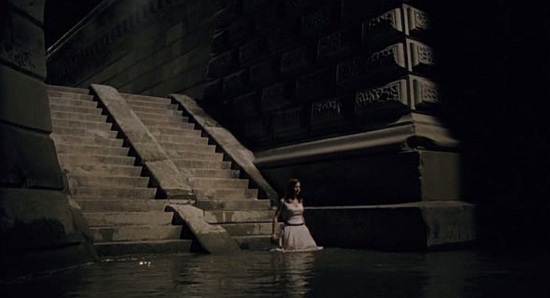
He's rewriting the story but still it's rather an exaggeration of –and true to– the original. See Anna's breakup with Ottavio, it's in Da Ponte's too, with some fun and some hope. Here it's extremely serious and deep, a perfect piece of drama, starting with the fact that Anna didn't mistakenly get together with Juan, but … it was real seduction. Does this hurt the original? No way! A real seduction with actual sex which she'll lie about (and Ottavio notices it when looking at the incoming calls). Holten rewrote this part of the story but didn't change the music nor the words! I mean beyond translation. The fact that Anna now did have sex with Juan doesn't actually contradict the original in any sense … it just makes the scene and all the consequences make sense.
It is the most intense part of the film when we see this decent Anna tell a different story by her tongue than what we see on the screen (having passionately fallen for Juan). She lies and Ottavio knows it and when it's the end it'll be serious. The consequences are far more serious – they all are from the moment of the seduction in scene one.
Holten is kind of omitting the “buffa” motif from his adaptation. This is true but not the whole truth though, cause he rather seems to go for the real depths of consequences and leaving out “buffa” motifs only as collateral damage. The point is not that.
Originally it is a drama too but interpreted in a fun way: “the bad guy gets it!”, we can laugh. Laughing is a key element in the original as a way for the “A”-type esthetic character of confronting the dimension of ethics by laughing at it – or to be confronted by it, see: “Di rider finirai” – “You will have your last laugh”. In the original Don Giovanni laughs till the end. For Holten, Juan get's doomed at the Finalé of ACT 1 (we know all about you now). What from here comes it's “just” the consequences of all what's sung and done in ACT 1.
Zerlina – the epicenter
Holten's translation of the story to today's terms involves a constant matching of the original scenes and the dramatic turns to today's reality. How would it happen? This is how most of the buffa gets omitted and turned into serious.
One of the key sources where buffa motifs originally come from is Masetto's character. He as a peasant guy who will hide from Don Giovanni or bow at his Lordship, or get beaten by him, couldn't fit the adaptation. These scenes in which he'd be degraded as a peasant didn't make it to Holten's. This is just extremely important because what Zerlina does (to Juan) we will find Masetto's steadiness behind it. A contract actually … A contract of marriage, as a matter of fact – to fit the Kierkegaardian interpretation of the story most brilliantly ...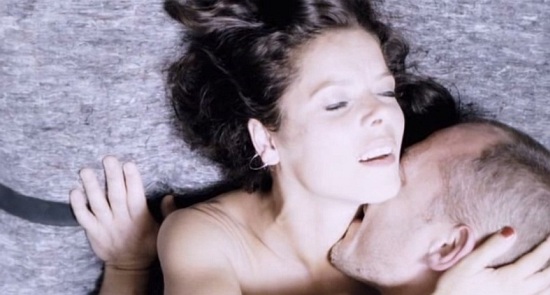
For Holten Neither Masetto nor Zerlina can be peasants as degraded people. This, however changes a lot of things in the course of drama. Compared to the original our “protagonist”, Juan loses a lot of power because of this. When he meets Zerlina it'll be again, as with Anna, a beautiful and beautifully photographed seduction, Juan looks first, Zerlina looks back – right when she's singing: “unclip your bra”. Totally perfect.
The lines of the arias however, what she and Masetto sing, are a little bit … tuned up. Again a strategic rewrite. Instead of the funny lightweight text by Da Ponte mixing a "let's enjoy life" message with let's get married (which used to be ironic enough - but could not be understood today by all means) we get a perfect scene of a pragmatic marriage contract about how to keep the other party from wanting to leave you, keeping up some personal freedom for you though. This is again totally faithful translation. No distorsion, just making the scene self-explanatory.
This contract becomes totally important since our Juan interrupts the making of it, and gets between these contracting parties (it is an engagement party). Holten pragmatically and precisely describes what Zerlina is thinking when she's being seduced. This is a counter-contract, a contract that could overweight and overwrite the one made to Masetto. “Our lives could change so much. But will he lie and go?” So, when they two get interrupted by Elvira (this is her main dramatic function, interrupting the present from the past as a consequence) their seduction-contract scene is ending with the word “sure” which was the first at the beginning of the contract making in the cab. “not so sure”, and to the end we get a look from Zerlina, that of vengeance-thirst. From look to look, from the first look of interest to the last look of declaring war. Quite an arch of a story.
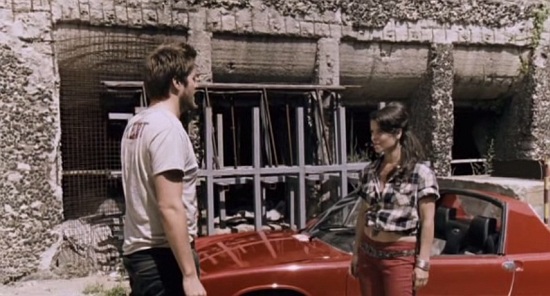
Now what happens next is the most difficult part of the opera, the “batti, batti” scene which made Zerlina the symbol of anti-feminism in the first place. For Holten it's just a piece of cake though! Because in his concept of consequences it's clear thatZerlina is trying to make it up with Masetto after actually wanting to be with Juan (as opposed to being silly and sassy and attracted). It all makes perfect sense. Zerlina is not a sissy anymore, she's a totally pragmatic BITCH now she's going back to plan B. But Masetto (wearing a T-shirt meaningfully with a scratched out sign “KURT”) won't buy it. This little difference to the original makes a huge sense in the whole of the story. He won't buy it because he is sticking to the principles of ethics. What has been done can't be just sung thru. His "B"-type ethical sturdyness becomes a conflict ... becomes a force that Zerlina and thru her even Juan will have to yield to ...
What happens at the party? How does she get seduced? Again? In Holten's adaptation, inthe world of consequences she'll be working on getting Masetto back and the last thing she'd do is to go away with Juan again. Infact her scream will have a totally opposite meaning, comingfrom an act of an opposite nature. It's not gonna be Juan taking the sissy but the other way around: Zerlina while still obviously fallen for Juan will finish him publicly by the fake screamings … to get Masetto finally back.
Holten, once again, like with the opening scene with Anna, only changed what we wouldn't see anyhow, he changed what intention was behind the scream. A small difference which changes the whole story. Now it's Zerlina who seduces Juan, for the first time in history – and it makes sense! Zerlina defeats Don Juan! And it makes perfect sense. Not the Marble statue who strikes back on Juan – but our beautiful fragile Zerlina, still, in the name of ethics.
The beauty of the scene of Juan's doom (we know all about you now) is that he keeps looking at young girls at the party as a cornered predator animal. It is amazingly photographed – not to mention acting!:))
the highest point – the magnificence of esthetics
Holten's version does work perfectly. The picture becomes clear and makes it obvious how to sort out all the details. The entire act two is a little bit emptied out. After seeing Holten's adaptation we can actually no longer see it otherwise, for example the dinner scene with him eating alone waiting for the transcendent end to come we can't see but a sad situation now.
Speaking of which, there's a few things that we don't like in the adaptation but we wouldn't like to devote an entire chapter to them – cause the whole is so brilliant! But here we can quickly mention that the killing scene in that store is not nice (this and the trailer made the writer of these lines not to watch the film in 2011 at a festival, for free). That killing is not necessary and it's not in the original either – not in any form. Also, the concept of his conscience fighting him doesn't need a murder – another one. Even if we live in a material world.
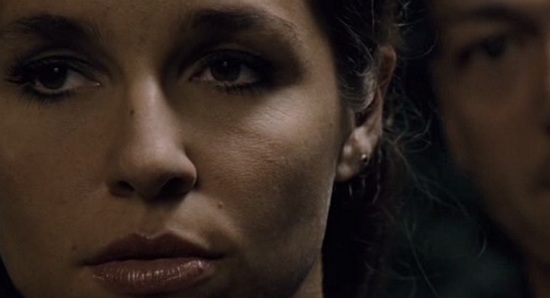
Also that drug thing .. doesn't come handy in the picture – not to mention as a base for his hallucination. But the rest of the Act 2 is very good, really beautiful and very well thought up! Let's mention it here that this adaptation will very probably be influential for at least as long as the Losey version has been, cause it does explain, does interpret the original in the most benevolent way, allowing the viewer to switch back and listen to Giulini's version (from 1959) any time! Or see any performance! This is a beautiful adaptation which brings The Opera extremely close to the viewer. Thanks for that, indeed! Just one more negative criticism, at the party there could have been some playing interference with the DJ-s music, like in the original (where 2-3 different mini-orchestras were playing). But this really only comes to one's mind because it is really so great!
So, here we are, at the highest point. It seems only as a little resting in the original, but here it's … the most passionate confession about …. living in the esthetic stadium, being Juan. This song, this serenade is just a beautiful piece, but here in Holten's adaptation (owing to the consistent visual story telling throughout the whole composition) it's a high point – the highest point.
Originally it's Elvira's maid, here: a girl from the party (cinematographer András Nagy made sure that she'd be seen quite a few times at the party to make it a revelation when Juan catches sight of her outside). What we see totally fits the original, cause she's a seduction target plus-one. The beast in Juan can't stop and even in a sort of a break time he'll go for a next target. Here this is more dramatic though.
The wonderful Christopher Maltman sings face to face with the object of his desire of the moment. This song, this aria is again a live act, imagine singing when flames are all over in the background, and also the lights of fire brigade which are parallel to the lights of police who's been after him all the time. Singing in front of a scene of glowing disaster is already a great attribution, giving a deep meaning to what we see.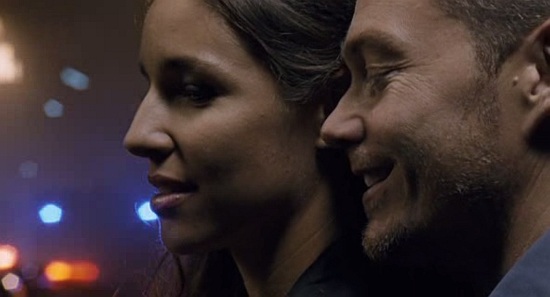
What this song gives us thru Molten's performance and Nagy's images is the essence of estheticness. Juan loves all the women because they are beautiful, because they are beauty. He's not lying to them when he wants to get them and when he's saying that they are beautiful. He's attracted. Deeply. Heavily.
Beauty is a continuous sensation for him in which he's rolling. Now, at this resting point … however … he's singing to an subject of desire which he can't have … Not because she won't have a sexual affair with him, but because she's just one of them …
She's just one picture of a flow … Because she's fleeting … She'd be fleeting even if Juan didn't only want her temporarily but forever … What Juan does is not having her but losing. Like sand flowing out from his hand …
Serenade to beauty which can't be held … Isn't it as if this was the most beautiful moment of his life and he was wishing that it wouldn't pass away – cause it's so beautiful? Isn't it as if he was breaking up with this beauty, letting her go, because it is impossible to keep her anyway? Because beauty takes place in fleeting time and this is exactly the beauty of it? We can't help thinking of Kierkegaard's "A" ... and of the passing nature of beauty.
It is truly a shining beautiful moment. A stunning depiction of passion for beauty, allowing us to be touched by Mozart's music directly – for this is what this wonderful movie does ...
